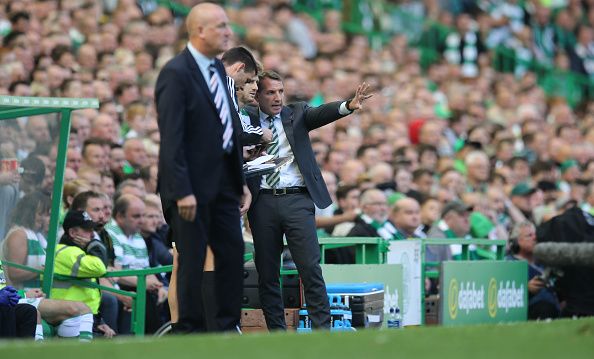Brendan Rodgers expects his players to work extremely hard.
Celtic are 27 points clear of second place Aberdeen in the Scottish Premiership, so you might argue they could probably drop a level or two in training and still coast to the league title.
But Rodgers isn’t about to let that happen, and has been speaking about the standards he expects his players to maintain. He cited the case of Dedryck Boyata as an example for others to follow.
The Belgian defender found himself out of the Celtic team, but responded to the challenge of getting back into the squad in the best possible way.
“When he wasn’t in the squad for games he’d come back here (Lennoxtown),” Rodgers told the BBC in a wide-ranging interview.
“And he’d be working in the gym to midnight and beyond so when his chance came he was going to be ready. I always say to them, ‘The door will open for you, just be ready to come through it’.”
Rodgers also spoke about how hard he had to work in his career. The Northern Irishman’s playing career was ended through injury when he was just 20.
He switched his focus to becoming a coach, and worked in a warehouse in Berkshire to support himself and his family as he completed his coaching badges.
“That was the making of me,” the former Liverpool manager said.
“When I was a young player and I had to quit, at the time academies weren’t around so there weren’t many jobs in football. I always wanted to coach but I had a family and I had to provide for them.
“So I got a job with John Lewis in their main warehouse in Bracknell while I was doing my coaching badges.
“I’d be up at five o’clock in the morning and doing a 12-hour shift, five days a week and after that I went coaching. I knew what I wanted to do.”
Rodgers also spoke about the mentality of young Irish and Scottish players, and the key message he tries to convey to them.
“With Scottish, and Irish players, it’s just letting them know that they’ve been given a talent and when you’re young you can get away with just talent.
“You can be the quickest boy in school, the strongest, the most skilful, but as you progress into your professional life it’s about talent plus the hard work. The talent alone at this point will be no good for you.
“What happens sometimes with young Scottish and Irish players that I’ve seen and worked with is other things come into their life and they become wasted talents. With wasted talents what you get is they still play but they blame everyone else.”








































